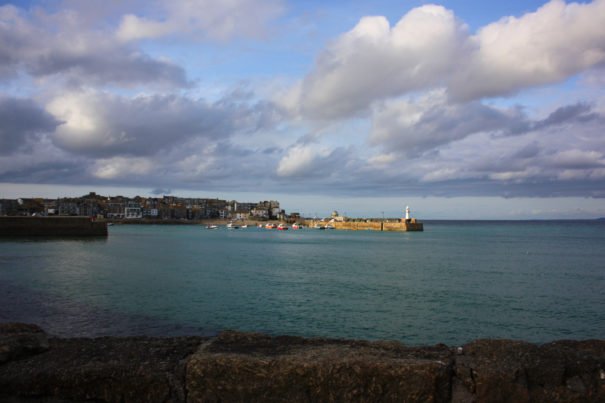
There Is No Period After the “St” in St Ives and Other Cornwall Stuff

There Is No Period After the “St” in St Ives and Other Cornwall Stuff
Cider in Cornwall
We had driven five hours from London to get to St Ives, on the western tip of Cornwall, England. On single-lane roads on which we were the only car, past cliffs looking over the Celtic Sea, under bridges with faded EU flags tied onto them, flapping in the wind—the last remnants of a referendum in which Cornwall voted overwhelmingly to leave.
In St Ives, we waited another 30 minutes to find a seat at the Sloop Inn, a small, crowded pub on the beach, established in 1312. St Ives is quiet; walk down its narrow alleys through the white houses, and you can even hear the wind blowing. But the Sloop Inn was noisy. Ale flowed, a busker played, a tourist took pictures of everything.
We ordered a local cloudy cider—a Rattlers Cyder, poured from a snake-shaped tap. Cornish cider isn’t much different from ciders you get elsewhere, just stronger. This one is fizzy and bitter.
We had just begun to taste it when Marshall arrived. A local man in his 20s, blonde, blue-eyed, with an incredibly round face and a blue hoodie.
“Mind if I sit with you, mate?” He’s had a few. “This is the best place in St Ives,” he said to nobody in particular. He started to ramble.
To Marshall, St Ives is the best place in the world: it has “the best” New Year’s celebrations, in which people dress up and head to the beach to watch fireworks (“Well, the best after London. And Edinburgh”); he thinks it has the best Cornish pasties, baked thick-crust pastries originally made for miners so they could eat their meals warm and with their hands (“Well, the best after the ones you get in the countryside”), and the best light to paint—a blade through your eyes when the sun is out.
“It is touristy, so you get all the shops and bars, but it doesn’t lose its Cornish identity, its character,” he said.
But it seems that Cornwall is changing. It’s still largely dependent on agriculture, but one by one, its sources of wealth have waned. Once, it relied on fishery and mining, but then, with foreign competition, those industries became unprofitable. Cornwall became one of the poorest areas in Britain. More recently, it has relied on tourism and EU subsidies. (Cornwall qualifies for poverty-related EU grants, but soon won’t be receiving those anymore.)
Tourism, though, doesn’t seem to be waning. In St Ives, the fishermen’s inns have given way to tourists’ residences and dozens of art galleries, as artists flocked here, lured by the light. Taverns have become bars and restaurants by the beach.
Some 45 minutes later, we still hadn’t had a chance to talk to each other. Marshall was telling us about an adventure he had in France with eight people in one car. Then he realized he’d finished his drink.
He mumbled something that must have meant “Nice to meet you and good-bye” and left us half-apologetically.
Our moment had gone. The busker had gone. The Inn was getting quieter, the wind chillier. The sun had disappeared behind the houses. We contemplated having another cider while we watched Marshall wobble away. Nah, not this time.